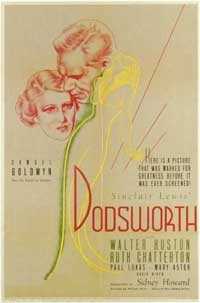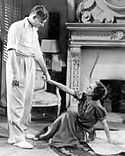Dodsworth (film)
| Dodsworth | |
|---|---|
 Theatrical release poster | |
| Directed by | William Wyler |
| Produced by |
Samuel Goldwyn Merritt Hulburd |
| Written by |
Sidney Howard Adapted from his play based on the novel by Sinclair Lewis |
| Starring |
Walter Huston Ruth Chatterton Paul Lukas Mary Astor |
| Music by | Alfred Newman |
| Cinematography | Rudolph Maté |
| Editing by | Daniel Mandell |
| Studio | Samuel Goldwyn Productions |
| Distributed by | United Artists |
| Release dates |
|
| Running time | 101 minutes |
| Country | United States |
| Language | English |
| Box office | $1.6 million[1] |
Dodsworth is a 1936 American drama film directed by William Wyler. Sidney Howard based the screenplay on his 1934 stage adaptation of the 1929 novel of the same name by Sinclair Lewis. Through the title character, it examines the differences between US and European intellect, manners, and morals.
Synopsis
Middle-aged Sam Dodsworth (Huston) is the head of Dodsworth Motor Company, an automobile manufacturing firm. His wife Fran (Chatterton), a shallow and vain woman obsessed with the fear of growing old, convinces her spouse to sell his interest in the company and take her to Europe.
Before long, Fran begins to view herself as a sophisticated world traveler and Sam as boring and unimaginative. Searching for excitement in her life, she begins spending time with other men and eventually informs Sam that she's leaving him for a member of the nobility (Gregory Gaye). Sam remains in Europe, seeing the sights, but otherwise drifting aimlessly.
While in Italy, Sam reunites with Edith Cortright (Astor), a divorcee he first met aboard the Queen Mary en route to Europe, and the couple fall in love. When Fran's plan to marry the nobleman falls through because of the objections of his mother (Ouspenskaya), she calls off the divorce. Sam rejoins her on a ship to sail back to America.
In the climactic scene, Sam realizes his marriage to Fran is over. He gets off the ship at the last moment to rejoin Edith after he realizes just how much he cares for her.
Principal cast
- Walter Huston ..... Sam Dodsworth
- Ruth Chatterton ..... Fran Dodsworth
- Paul Lukas ..... Arnold Iselin
- Mary Astor ..... Mrs. Edith Cortright
- Kathryn Marlowe ..... Emily Dodsworth McKee
- David Niven ..... Captain Clyde Lockert
- Gregory Gaye ..... Baron Kurt Von Obersdorf
- Maria Ouspenskaya .....Baroness Von Obersdorf
- Odette Myrtil ..... Renée De Penable
- John Payne ..... Harry McKee
- Spring Byington ..... Matey Pearson
- Harlan Briggs ..... Tubby Pearson
Additional production credits
- Art Direction ..... Richard Day
- Costume Design ..... Omar Kiam
Production notes

This was one of two 1936 films directed by William Wyler based on plays. The other was These Three starring Miriam Hopkins which was an adaptation of Lillian Hellman's The Children's Hour which was modified to conform with the Production Code. The adaptation led David O. Selznick to hire Sidney Howard for the script of Gone With the Wind.[3]
Critical reception
In his review in the New York Times, Frank S. Nugent described it as "admirable" and added, "William Wyler . . . has had the skill to execute it in cinematic terms, and a gifted cast has been able to bring the whole alive to our complete satisfaction . . . [the film] has done more than justice to Mr. Howard's play, converting a necessarily episodic tale . . . into a smooth-flowing narrative of sustained interest, well-defined performance and good talk."[4]
Time said it was "directed with a proper understanding of its values by William Wyler, splendidly cast and brilliantly played."[5]
The film was named one of the year's ten best by The New York Times and was one of the top twenty box office films of the year.
In 1990, Dodsworth was selected for preservation in the United States National Film Registry. In 2005, Time named it one of the 100 best movies of the past 80 years.[6]
Awards and nominations
The film was nominated in seven categories, winning for Best Art Direction.[7]
- Academy Award for Best Picture (nominee)[8]
- Academy Award for Best Actor (Walter Huston, nominee)
- Academy Award for Best Supporting Actress (Maria Ouspenskaya, nominee)
- Academy Award for Best Director (nominee)
- Academy Award for Best Art Direction (winner)
- Academy Award for Best Sound, Recording (Thomas T. Moulton) (nominee)
- Academy Award for Best Writing, Screenplay (nominee)
Dodsworth was nominated for AFI's 100 Years... 100 Movies in 1997[9] and 2007.[10]
References
- ↑ "WHICH CINEMA FILMS HAVE EARNED THE MOST MONEY SINCE 1914?.". The Argus (Melbourne, Vic. : 1848 - 1956) (Melbourne, Vic.: National Library of Australia). 4 March 1944. p. 3 Supplement: The Argus Weekend magazine. Retrieved 6 August 2012.
- ↑ Dodsworth at Turner Classic Movies
- ↑ David Thomson Have Yoy Seen?, London: Allen Lane, New York: Knopf, 2008, p.230
- ↑ New York Times review
- ↑ Time review
- ↑ Dodsworth at Time All-Time 100 Best Films
- ↑ "The 9th Academy Awards (1936) Nominees and Winners". oscars.org. Retrieved 2011-08-08.
- ↑ "NY Times: Dodsworth". NY Times. Retrieved 2008-12-08.
- ↑ AFI's 100 Years...100 Movies Nominees
- ↑ AFI's 100 Years...100 Movies (10th Anniversary Edition) Ballot
External links
| |||||